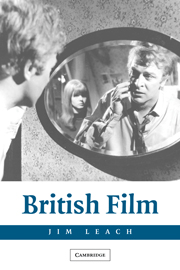Book contents
- Frontmatter
- Contents
- Acknowledgments
- Introduction
- 1 The National Health: Great Britain/Deep England
- 2 The Magic Box: What Is British Cinema?
- 3 The Common Touch: The Art of Being Realistic
- 4 The Mirror Crack'd: British Expressionism
- 5 Millions like Us: National Cinema as Popular Cinema
- 6 The Stars Look Down: Acting British
- 7 No Sex Please – We're British: Sex, Gender, and the National Character
- 8 Carry On Regardless: The British Sense of Humor
- 9 Sexy Beasts: British Monsters
- 10 The Ruling Class: Ideology and the School Movie
- 11 The Long Memory: History and Heritage
- 12 I'm British but … : Empire and After
- Notes
- Bibliography
- Filmography
- Index
11 - The Long Memory: History and Heritage
Published online by Cambridge University Press: 07 May 2010
- Frontmatter
- Contents
- Acknowledgments
- Introduction
- 1 The National Health: Great Britain/Deep England
- 2 The Magic Box: What Is British Cinema?
- 3 The Common Touch: The Art of Being Realistic
- 4 The Mirror Crack'd: British Expressionism
- 5 Millions like Us: National Cinema as Popular Cinema
- 6 The Stars Look Down: Acting British
- 7 No Sex Please – We're British: Sex, Gender, and the National Character
- 8 Carry On Regardless: The British Sense of Humor
- 9 Sexy Beasts: British Monsters
- 10 The Ruling Class: Ideology and the School Movie
- 11 The Long Memory: History and Heritage
- 12 I'm British but … : Empire and After
- Notes
- Bibliography
- Filmography
- Index
Summary
The past is a highly visible presence in the British landscape. In his historical account of The Making of the English Landscape, first published in 1955, W. G. Hoskins described the signs of human settlement across the country dating back to pre-Roman times. Revisiting his work twenty years later, Hoskins noted that recent discoveries show that “everything is older than we think,” and he went on to suggest that an attention to the historical landscape offers “refreshment and sanctuary from noise and meaningless movement.” Other historians have challenged this idea of the past as a refuge from the ravages of modernity, pointing out that many national traditions that seem to have their roots in the “deep past” are relatively recent fabrications. Eric Hobsbawm thus argues that the dominant myths of national identity depend on the “invention of tradition” and that it is “the very appearance of movements for the defence or revival of traditions” that provides evidence of a break with the past.
In a discussion of Hobsbawm's argument, Robert Colls suggests that it tends to simplify the “complex and overlapping processes of invention, transformation and recovery.”’ The sense of “living in an old country” thus involves an intricate combination of historical awareness and mythmaking. As Peter Miles and Malcolm Smith suggest, “the past is, in fact, simply dead and gone,” but “assumptions about the lived experience of the past must form part of our lived culture in the here and now; history works for society as a whole as memory works for the individual.”
- Type
- Chapter
- Information
- British Film , pp. 199 - 218Publisher: Cambridge University PressPrint publication year: 2004
- 1
- Cited by



